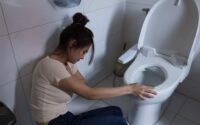Ear doctor demonstrates how to safely remove stubborn earwax
Listen up!
An Ohio-based ear, nose, and throat surgeon is revealing how to properly clean wax out of ears — and it doesn’t involve cotton swabs.
Cotton swabs “really weren’t made to clean your ears — all they do is just push the wax deeper down into your ear canal and this causes an impaction,” Dr. Tonia L. Farmer, who goes by Dr. Nose Best, said in a TikTok last week.
Children are especially vulnerable to ear injuries from swabs. 263,338 kids — about 34 a day — were treated for this type of trauma in US emergency rooms between 1990 and 2010.
Farmer notes that “ears clean themselves naturally like a self-cleaning oven,” so she recommends simply using a moist washcloth to clean the outer part of the ear canal as the wax is pushed outward.
Earwax is composed of secretions from oil and sweat glands, dead skin cells, hair and debris.
The wax sweeps up dirt, dust and bacteria, protecting the ear canal from irritation, infection and dryness.
If you have small ear canals or dry earwax buildup, Farmer advises using a wax-softening agent such as mineral oil or hydrogen peroxide or removal drops like Debrox.
A water-filled baby bulb syringe can also flush the wax out.
However, Farmer warns against trendy earwax removal tools that feature a camera that allows you to look inside your ear canal while burrowing for wax.
“Those are just like Q-tips — they can just push the wax further down in your ear. So if you have them at home and you’re using them, you have to do it with a lot of caution because you can even injure your eardrum,” Farmer said.
“You might need to see your primary care provider or an ENT specialist like myself for a professional cleaning when necessary.”
She says her patients come in every few months to get their ears cleaned. Untreated wax buildup can cause an earache, pressure in the ear, an ear infection, dizziness, or hearing loss.
“Here’s my last tip,” Farmer concluded her 2-minute clip.
“Don’t put anything smaller than your elbow in your ear canal.”


